Focus on Faculty
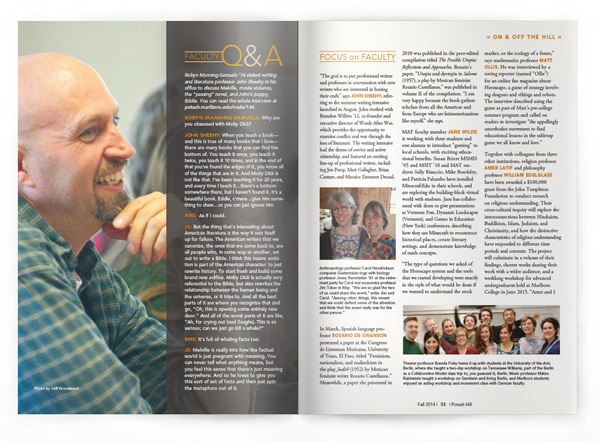
Faculty Q & A
Robyn Manning-Samuels ’14 visited writing and literature professor John Sheehy in his office to discuss Melville, movie violence, the “passing” novel, and John’s puppy, Eddie. You can read the whole interview.
Robyn Manning-Samuels: Why are you obsessed with Moby Dick?
John Sheehy: When you teach a book—and this is true of many books that I love— there are many books that you can find the bottom of. You teach it once, you teach it twice, you teach it 10 times, and in the end of that you’ve found the edges of it, you know all of the things that are in it. And Moby Dick is not like that. I’ve been teaching it for 20 years, and every time I teach it…there’s a bottom somewhere there, but I haven’t found it. It’s a beautiful book. Eddie, c’mere…give him something to chew…or you can just ignore him.
RMS: As if I could.
JS: But the thing that’s interesting about American literature is the way it sets itself up for failure. The American writers that we canonize, the ones that we come back to, are all people who, in some way or another, set out to write a Bible. I think this insane ambition is part of the American character: to just rewrite history. To start fresh and build some brand new edifice. Moby Dick is actually very referential to the Bible, but also rewrites the relationship between the human being and the universe, or it tries to. And all the best parts of it are where you recognize that and go, “Oh, this is opening some entirely new door.” And all of the worst parts of it are like, “Ah, for crying out loud (laughs). This is so serious; can we just go kill a whale?”
RMS: It’s full of whaling facts too.
JS: Melville is really into how the factual world is just pregnant with meaning. You can never tell what anything means, but you feel this sense that there’s just meaning everywhere. And so he loves to give you this sort of set of facts and then just spin the metaphors out of it.
Focus on Faculty
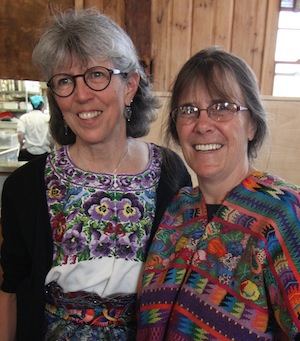
“The goal is to put professional writers and professors in conversation with new writers who are interested in honing their craft,” says John Sheehy, referring to the summer writing intensive launched in August. John worked with Brandon Willitts ’12, co-founder and executive director of Words After War, which provides the opportunity to examine conflict and war through the lens of literature. The writing intensive had the theme of service and active citizenship, and featured an exciting line-up of professional writers, including Jen Percy, Matt Gallagher, Brian Castner, and Maurice Emerson Decaul.
In March, Spanish language professor Rosario de Swanson presented a paper at the Congreso de Literatura Mexicana, University of Texas, El Paso, titled “Feminism, nationalism, and malinchism in the play Judith (1952) by Mexican feminist writer Rosario Castellanos.” Meanwhile, a paper she presented in 2010 was published in the peer-edited compilation titled The Possible Utopia: Reflections and Approaches. Rosario’s paper, “Utopia and dystopia in Salome (1957), a play by Mexican feminist Rosario Castellanos,” was published in volume II of the compilation. “I am very happy because the book gathers scholars from all the Americas and from Europe who are latinomericanistas like myself,” she says.
MAT faculty member Jane Wilde is working with three students and one alumna to introduce “gaming” to local schools, with exciting educational benefits. Susan Briere MSMIS ’05 and MSIT ’10 and MAT students Sally Bisaccio, Mike Beardsley, and Patricia Palumbo have installed MinecraftEdu in their schools, and are exploring the building-block virtual world with students. Jane has collaborated with them to give presentations at Vermont Fest, Dynamic Landscapes (Vermont), and Games in Education (New York) conferences, describing how they use Minecraft to reconstruct historical places, create literary settings, and demonstrate knowledge of math concepts.
“The type of questions we asked of the Heroscape system and the tools that we started developing were exactly in the style of what would be done if we wanted to understand the stock market, or the ecology of a forest,” says mathematics professor Matt Ollis. He was interviewed by a roving reporter (named “Ollie”) for an online fan magazine about Heroscape, a game of strategy involving dragons and vikings and robots. The interview described using the game as part of Matt’s pre-college summer program and called on readers to investigate “the appallingly unorthodox movement to find educational lessons in the tabletop game we all know and love.”

Together with colleagues from three other institutions, religion professor Amer Latif and philosophy professor William Edelglass have been awarded a $100,000 grant from the John Templeton Foundation to conduct research on religious understanding. Their cross-cultural inquiry will explore the interconnections between Hinduism, Buddhism, Islam, Judaism, and Christianity, and how the distinctive characteristics of religious understanding have responded to different time periods and contexts. The project will culminate in a volume of their findings, shorter works sharing their work with a wider audience, and a weeklong workshop for advanced undergraduates held at Marlboro College in June 2015. “Amer and I are very excited to collaborate with each other and our colleagues elsewhere on this grant, and also with our students here at Marlboro,” says William. “We will be co-teaching a course in the fall that engages the themes of our research and are grateful to be able to share our work with our remarkable students.”
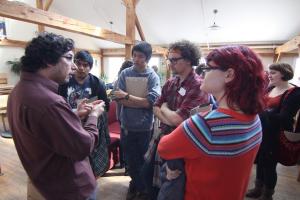
French language professor Boukary “Abou” Sawadogo travelled to the Sundance Film Festival in January and published his summary of African-themed and Africandirected films in Film International, an online journal of film culture. In “Africa at Sundance 2014: The Quest for Global Humanity,” Abou focuses on three films that “seek to sound the alarm against oppressive practices and to introduce to the world African figures whose sociopolitical engagement has universal resonance.” On a much lighter note, in April Abou presented his own film, Salut Y’all: African Teachers on the Bayou, followed by a discussion in Apple Tree.
In June, MDO faculty member Kerry Secrest was named Honorary Consul of the Republic of Lithuania to the State of Vermont. “Lithuania has always been a big part of my life, and I am looking forward to helping serve as a bridge between these two parts of the world that I love,” says Kerry, who is a fourthgeneration Lithuanian-American. She grew up going each summer to Camp Neringa in Marlboro, Vermont, founded in the 1960s to preserve the Lithuanian heritage and culture. “The Lithuanian officials I’ve been speaking with are very interested in Vermont’s local food movement and socially responsible businesses, where Vermont is really at the forefront.”
The term “middle class” has been bandied about so much lately that now everyone wants a membership. American studies professor Kate Ratcliff suggests that, thanks to Hollywood, even the rich enjoy identifying themselves as middle class. “The reality created by the commercial mass media is one in which everyone is middle class,” she was quoted in a U.S. News & World Report article titled “What it means to be middle class today.” “Advertising, television and movies all convey a world in which middle- class affluence is an American birthright.”
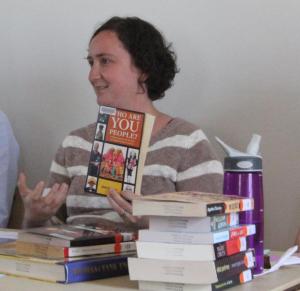
Last spring, religion professor Amer Latif led a book discussion series on Muslim literature and culture at the Brooks Memorial Library, in Brattleboro. The series, titled Muslim Journeys, included five books ranging from the classic Arabian Nights to the contemporary Minaret, by Leila Aboulela, a novel challenging the perception that Islam oppresses women. In an article in The Commons, Amer said that his goal in leading the series was to “share Muslim voices free from some social issues in order to help others see truths that are transcultural.” The series was presented by Amer on behalf of the National Endowment for the Humanities, as part of their Bridging Cultures initiative.
“The successful entrepreneur is someone who knows what to hang on to and is dedicated to purpose,” writes MBA faculty member Will Keyser. Will’s recent ebook, Telling StartUp Stories: Keep the End in Mind, shares his expertise in “StartUp” storytelling, which he suggests is the most effective form of communication available to the entrepreneur. “Data is necessary, but no longer sufficient to sell your idea for seeking sales, or finding funding,” he writes. Will is working on his second ebook, No Surprises: Essential Numbers for Entrepreneurs.
In May, Spanish language professor Rosario de Swanson was appointed to the Vermont State Advisory Committee for the U.S. Commission on Civil Rights. Rosario was one of 17 Vermonters appointed to the committee, which will conduct reviews on local issues of discrimination or other civil rights infringements in the areas of justice, voting, housing, and education. Having grown up in rural Mexico, and with a rich understanding of Latin American culture and literature, Rosario has a unique perspective to share on civil rights issues in Vermont.
In March, philosophy professor William Edelglass became the new co-director of the International Association of Environmental Philosophy (IAEP), the global forum for wide-ranging philosophical discussions of nature and the human relation to the natural world. The organization publishes the Journal of Environmental Philosophy, and its annual conference is one of the largest in the world on the subject. “IAEP exposes me to an enormous variety of ways of thinking, which helps me in my own curriculum at Marlboro,” says William, who has been co-editor of the Journal of Environmental Philosophy and a “member at large” on the executive committee for two years. “Seeing new ways of approaching nature is important to me.”
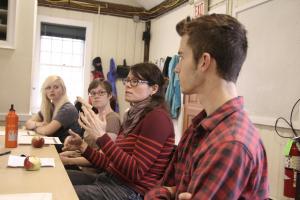
“I like chaos,” says visual art professor Cathy Osman. “I like creating a complex, chaotic, multileveled situation, then trying to find an order within that.” In March, she and colleague Tim Segar had a joint show and gallery talk at Greenfield Community College, in Massachusetts. The show combined Tim’s ceramic sculptures covered in roofing tar (“all the rage at Marlboro,” says Tim) with Cathy’s multimedia collages, all held together by Tim’s wall of hanging striped maples. “The wall alters the way you experience the space, and it has a linear relationship to some of the work Cathy is showing in her collages,” said Tim.
Anyone who has been involved with a nonprofit board knows how hard it is to raise money, and how necessary. Drawing on decades of experience, and tapping an expert team of fundraising trainers across North America, MDO faculty member Andy Robinson and his colleague Andrea Kihlstedt have responded to the need with Train Your Board (and Everyone Else) to Raise Money. This practical book contains easy-to-use training exercises for boards of all sizes and sophistication, developing skills that reduce the barriers to fundraising and help boards make their case.
